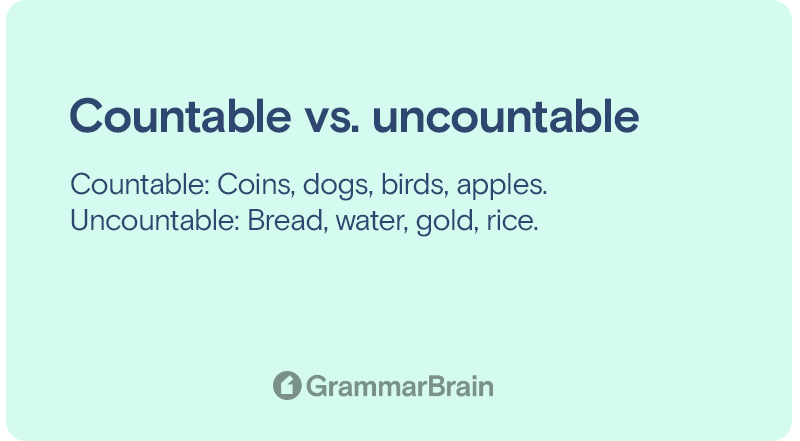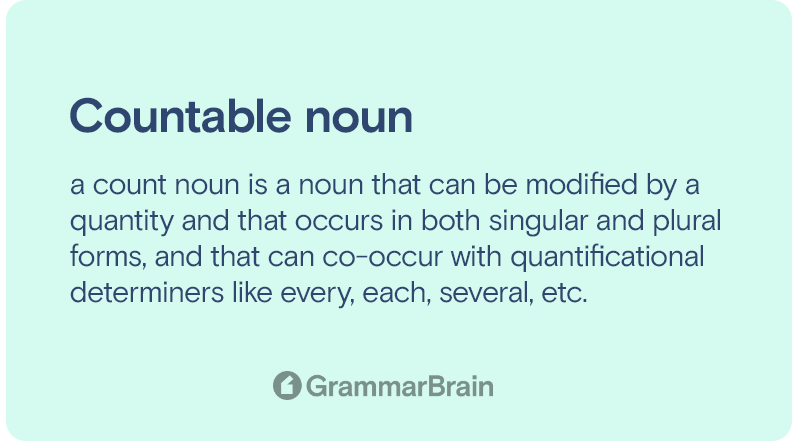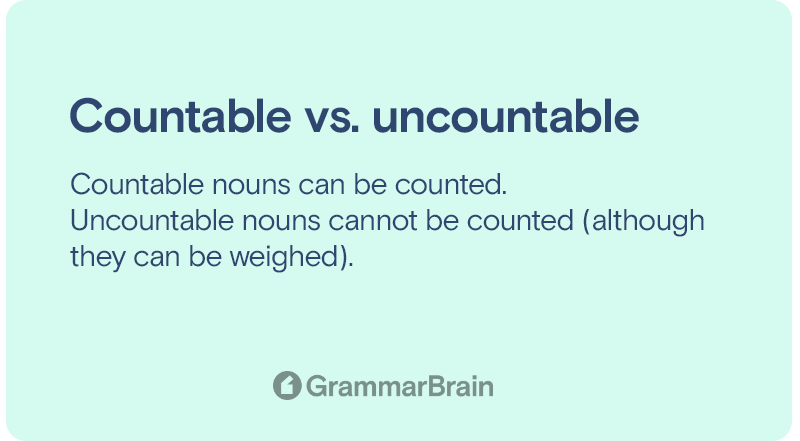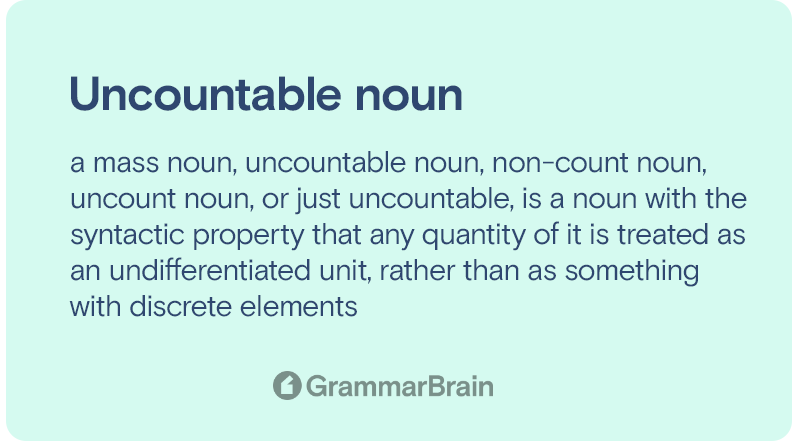What are countable and uncountable nouns? Nouns can identify places, people, animals, and other things. They are the basic materials required to construct sentences. There are different types of nouns, including proper nouns, common nouns, compound nouns, collective nouns, abstract nouns, and countable and uncountable nouns.
Each of these may have specific purposes. For instance, proper nouns help identify different objects by their names. Similarly, collective nouns represent groups.
Since nouns represent different things, they may also be countable and uncountable. Some items may be countable, and you can count them, whereas others may be beyond numbers.
| Form | Example |
| Countable Noun | Coins, dogs, birds, apples. |
| Uncountable Noun | Bread, water, gold, rice. |
| Form | Definition |
| Countable Noun | The nouns that can be counted are called countable nouns. |
| Uncountable Noun (Mass Noun) | The nouns that cannot be counted, although they can be measured or weighed, are called uncountable nouns. |

What is a Countable Noun?
As the name suggests, you can represent the different things around you that you can count with the help of countable nouns. So, be it places, animals, people, or anything else, there must be a definite number or quantifier.
For instance, ‘There may be at least ten candles on the birthday cake,’ or ‘There are several notable paintings in this gallery.’
Countable nouns may be singular or plural, depending on the context. For example, a book lay on the table,’ or ‘There are 5,000 employees in that company.’

Definition of Countable Noun
Countable nouns, or count nouns, are those nouns that go together with indefinite articles in the singular or plural forms.
Nouns that can be modified using quantities and occur in singular and plural forms, along with quantity determiners, are countable.
So, according to this definition, anything you can represent using a definite or indefinite quantity is a countable noun. Definite determiners are pure numbers. Indefinite denotations, however, can be used when you don’t know the numbers or quantities.

What is an Uncountable Noun?
Anything you cannot represent using a definite quantifier is an uncountable noun. In other words, uncountable nouns are those things that you cannot count.
For instance, ‘There is no water in the pond,’ or ‘Get rid of the garbage.’
Here, ‘water’ and ‘garbage’ are uncountable since a definite number or quantity cannot represent them.

Definition of an Uncountable Noun
In linguistics, uncountable nouns, mass nouns, or non-count nouns are distinguished forms of countable nouns with a syntactic property where the quantity may be an undifferentiated unit rather than a discrete element.
Here, ‘undifferentiated unit’ means that tracking the objects in question may not be possible.
Countable vs. Uncountable Nouns
The most apparent difference between countable and uncountable nouns is that you can represent countable nouns by a definite number or quantifier. In contrast, the same is not true of uncountable nouns. However, this is not the only difference.
Countable nouns vary from uncountable nouns, depending on various other factors. For instance, countable nouns can assume both singular and plural forms, as against uncountable nouns, which may be only in the singular form.
Likewise, when you express countable nouns in the interrogative format, the question would be ‘how many?’ instead of ‘how much?’ for uncountable nouns.
So, the numbers, or quantifiers, become significant when referring to something countable.
Examples of Countable and Uncountable Nouns
Uncountable nouns may include bread, rice, coffee, luggage, money, and information.
Some objects, including money, or luggage, can be counted but are still uncountable, as there is too much.
For instance, you may be able to count money, as currency notes but not in an economy, or bank.
Besides this, you can count most other things or at least represent them using a quantifier.
Uncountable nouns (list)
| Alphabet | Uncountable Nouns |
| A | Aggression Assistance Attention Accommodation Advertising Air Athletics Access Adulthood Alcohol Applause Agriculture |
| B | Blood Botany Bacon Baggage Ballet Butter Biology |
| C | Carbon Cardboard Chalk Chess Coal Commerce Confusion Cookery Countryside Crockery Cutlery Chocolate |
| D | Determination Delight Depression Driving Dignity Dessert Design Dust Distribution Dirt Duty |
| E | Enjoyment Energy Envy Evil Engineering Entertainment Evolution Existence Ethics Evidence Employment |
| F | Fashion Forgiveness Faith Flour Flu Fear Fun Fame Freedom |
| G | Gasoline Genetics Garbage Growth Grief Grammar Garlic |
| H | Hospitality Homework Heat Hatred Hunger Honey |
| I | Ice Imagination Information Independence Infrastructure Industry Irony |
| J | Jealousy Jam Jewelry Joy |
| K | Kindness Knowledge Karate |
| L | Labour Lava Livestock Luggage Lightning Land Leather Linguistics |
| M | Management Mathematics Moonlight Methane Milk |
| N | Nature Nitrogen Nutrition Nonsense Nurture |
| O | Obedience Obesity Oxygen |
| P | Pepper Patience Permission Peace |
| Q | Quartz |
| R | Reliability Rum Recreation Reality Rubbish |
| S | Scenery Sewing Strength Space Software Seaside Stream |
| T | Toast Thunder Transportation Trust |
| U | Underwear Unemployment Unity |
| V | Veal Validity Vitality Vinegar |
| W | Whiskey Weather Wildlife Water Welfare |
| Y | Yoga Yeast |
| Z | Zinc |
Conclusion
Most things are countable. You can still measure or represent them using a suitable quantifier, even if they are not. However, the terms used to describe the numbers or quantities may vary, depending on several factors, primarily if the amount or number is not overwhelming.
You can determine if a noun is countable by counting or measuring it.
So, most objects are still countable even if there are too many and you may not be able to count them.
FAQs
What are some rules governing uncountable nouns?
You can represent any object that you cannot count, doesn’t come in definite numbers, or quantifiers as an uncountable noun.
However, uncountable objects have only singular forms and no plurals and may need definite articles to support them.
For instance, when you say, ‘I picked up the luggage,’ you may be referring to any luggage. However, when you say, ‘I picked up my luggage,’ you are referring specifically to your bags.
Similarly, when you say, ‘I need to see a doctor,’ you may be referring to any doctor. However, when you say, ‘I need to see the doctor,’ you may be referring to a specific doctor.
When it comes to quantifiers, you may need to be more specific when representing countable nouns. For instance, when you say, ‘The citizens came to the meeting,’ it becomes generic and can refer to the citizens of any place.
However, when you say, ‘Some citizens from the neighborhood came to the meeting,’ you are referring to a specific set of people.
Likewise, there are quantifiers that you can use only with uncountable nouns.
For example, ‘There’s little food left.’
There are other quantifiers that you can use with both countable and uncountable nouns. Examples may include all, some, any, and other such words.
For instance, ‘He made enough money for a well-to-do living.’
Uncountable nouns are always singular compared to countable nouns, which can be singular, or plural. However, some uncountable nouns assume plural forms although they are singular.
For example, when you say, ‘The furniture needs replacement,’ you may be referring to a set rather than a single chair or table.
Some nouns may seem plural but, in reality, are singular and may be hard to figure out. Examples include Mathematics or News.
For instance, when you say, ‘I’ve got some bad news,’ it can be challenging to determine whether ‘news,’ in this context, refers only to a single piece of information.
Inside this article
Fact checked:
Content is rigorously reviewed by a team of qualified and experienced fact checkers. Fact checkers review articles for factual accuracy, relevance, and timeliness. Learn more.
Core lessons
Glossary
- Abstract Noun
- Accusative Case
- Anecdote
- Antonym
- Active Sentence
- Adverb
- Adjective
- Allegory
- Alliteration
- Adjective Clause
- Adjective Phrase
- Ampersand
- Anastrophe
- Adverbial Clause
- Appositive Phrase
- Clause
- Compound Adjective
- Complex Sentence
- Compound Words
- Compound Predicate
- Common Noun
- Comparative Adjective
- Comparative and Superlative
- Compound Noun
- Compound Subject
- Compound Sentence
- Copular Verb
- Collective Noun
- Colloquialism
- Conciseness
- Consonance
- Conditional
- Concrete Noun
- Conjunction
- Conjugation
- Conditional Sentence
- Comma Splice
- Correlative Conjunction
- Coordinating Conjunction
- Coordinate Adjective
- Cumulative Adjective
- Dative Case
- Determiner
- Declarative Sentence
- Declarative Statement
- Direct Object Pronoun
- Direct Object
- Diction
- Diphthong
- Dangling Modifier
- Demonstrative Pronoun
- Demonstrative Adjective
- Direct Characterization
- Definite Article
- Doublespeak
- False Dilemma Fallacy
- Future Perfect Progressive
- Future Simple
- Future Perfect Continuous
- Future Perfect
- First Conditional
- Irregular Adjective
- Irregular Verb
- Imperative Sentence
- Indefinite Article
- Intransitive Verb
- Introductory Phrase
- Indefinite Pronoun
- Indirect Characterization
- Interrogative Sentence
- Intensive Pronoun
- Inanimate Object
- Indefinite Tense
- Infinitive Phrase
- Interjection
- Intensifier
- Infinitive
- Indicative Mood
- Participle
- Parallelism
- Prepositional Phrase
- Past Simple Tense
- Past Continuous Tense
- Past Perfect Tense
- Past Progressive Tense
- Present Simple Tense
- Present Perfect Tense
- Personal Pronoun
- Personification
- Persuasive Writing
- Parallel Structure
- Phrasal Verb
- Predicate Adjective
- Predicate Nominative
- Phonetic Language
- Plural Noun
- Punctuation
- Punctuation Marks
- Preposition
- Preposition of Place
- Parts of Speech
- Possessive Adjective
- Possessive Determiner
- Possessive Case
- Possessive Noun
- Proper Adjective
- Proper Noun
- Present Participle
- Prefix
- Predicate



